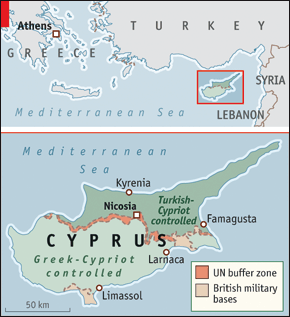The Cyprus talks
A fillip for Talat?
An international court ruling injects new life into fast-fading peace talks
Mar 11th 2010 | ATHENS | from the print edition

ON ANY small Mediterranean island, property is jealously protected. Orange and olive groves can be as valued as posh villas and sea views. Nowhere more than in Cyprus, split into Greek- and Turkish-Cypriot zones ever since Turkish troops invaded in 1974 after a coup aimed at Enosis, or unification with Greece.
For Greek-Cypriots who lost homes and businesses in the north, a settlement on property is key to reunifying the island. “Who gets their home back, who gets another property in exchange, who gets compensation: this is what really matters,” says a seasoned observer of the Cyprus talks. In 18 months of UN-sponsored negotiations, Demetris Christofias and Mehmet Ali Talat, respectively the Greek- and Turkish-Cypriot leaders, have broadly agreed over how a bizonal, bicommunal Cyprus should be governed. But they have avoided discussing in any detail the thorniest issues, including property.
This could change after a decision by the European Court of Human Rights in Strasbourg which, optimistic observers hope, may speed up the peace process. Instead of taking their cases straight to Strasbourg, Greek-Cypriots must now apply first to an “immovable property commission” in north Cyprus, established by Turkey, that has powers to restore property or award compensation. The alternative, says Achilleas Demetriades, a Greek-Cypriot lawyer, “is to wait for a political solution”—perhaps indefinitely.
The ECHR decision is a timely boost for the pro-settlement Mr Talat, who faces a tough contest to win next month’s presidential election in the north. His hardline nationalist opponent, Dervish Eroglu, has been far ahead in the polls because many Turkish-Cypriots are disillusioned with endless inconclusive peace talks. Mr Eroglu, who speaks little English, is seen as a reluctant negotiating partner for Mr Christofias. If the talks broke down, some diplomats say, the outcome might eventually be permanent partition.
But the idea that Greek-Cypriots will now have to work with a Turkish-Cypriot body may persuade Turkish-Cypriots that Mr Talat’s engagement has more to offer than Mr Eroglu’s hostility. And if Mr Christofias, an old communist, can keep his nationalist coalition partners at bay, there is enough time before the election for the two leaders to agree on an optimistic statement of progress that could further boost Mr Talat. After the ECHR ruling, Mr Talat has made up ground in the polls. He is just six points behind Mr Eroglu, down from 20 points a few months ago. His defeat no longer seems inevitable. If he is re-elected, the peace talks will gain fresh momentum.
It helps that Recep Tayyip Erdogan, the Turkish prime minister, is showing more interest in a Cyprus settlement. Earlier this month he took the unusual step of inviting a group of Greek-Cypriot journalists to Turkey. When asked about the withdrawal of the 35,000-odd Turkish troops in the north, Mr Erdogan made clear that, if a settlement were reached, they would leave.
The global recession has ended a boom in holiday-home construction on both sides of the UN buffer zone between the Greek- and Turkish-Cypriots. But the disappearance of foreign buyers has not yet brought a collapse in prices. And a peace deal would send property prices soaring. “We’d be able to attract top-tier American and Asian investors to Cyprus. We could even become the Bermuda of the Mediterranean,” says a Nicosia accountant whose parents once owned an orange grove.
from the print edition | Europe
